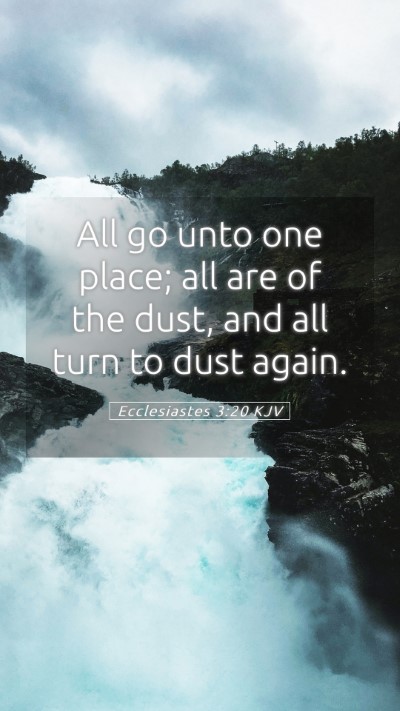Understanding Ecclesiastes 3:20
Ecclesiastes 3:20: "All go to one place; all are from the dust, and to dust all return."
This verse reflects a profound truth about human existence and mortality, encapsulating the cyclical nature of life and death. In this commentary, we will explore the meaning of this verse by combining insights from established public domain commentaries, providing a comprehensive understanding suitable for Bible study groups, online Bible study enthusiasts, and those seeking deeper scriptural insights.
Verse Meaning and Context
The writer of Ecclesiastes, traditionally attributed to King Solomon, grapples with the meaning of life in a world filled with vanity and uncertainty. In this chapter, he contemplates the various seasons of life, demonstrating how everything under heaven has its time – a time to be born, a time to die, a time to plant, and so forth.
Understanding the Core Message:
- Universality of Death: The verse emphasizes that death is a common fate for all humanity. Matthew Henry highlights the inevitability of mortality, suggesting that regardless of one’s status in life, everyone ultimately returns to the earth.
- The Cycle of Life: Albert Barnes notes the cyclical nature of existence, reminding readers that life is ephemeral. All humans originate from dust, and upon death, they return to it, reinforcing that earthly pursuits are ultimately transient.
- Equality in Death: Adam Clarke elaborates on the idea presented in this verse, pointing out that in death, distinctions of wealth, status, and success vanish. The grave is the great equalizer for humanity.
Biblical Exegesis and Theological Implications
Ecclesiastes 3:20 serves as a poignant reminder of the mortality of man and the divine nature in the creation narrative. As seen in Genesis 3:19, where God reminds Adam of his origin from dust, this passage reverberates with theological significance.
- Creation and Fall: The verse ties back to the creation account, sustaining the truth that human life is a divine gift and its end is predetermined by God’s design.
- Life After Death: While Ecclesiastes often reflects a sense of futility, this verse can also stir contemplation about life after death, leading to deeper theological inquiry about the promises found in Scripture regarding eternal life (John 3:16).
- Call to Reflection: The acknowledgment of death encourages introspection on how one lives. The significance of this verse invites believers to consider the eternal impact of their actions during their earthly journey (Colossians 3:1-2).
Application to Daily Life
Understanding Ecclesiastes 3:20 prompts individuals to reflect on their life's purpose and priorities. It serves as a call to focus on what truly matters in light of eternity.
- Embrace Simplicity: This scripture encourages a life of simplicity and gratitude, shifting the focus from material accumulation to meaningful relationships and spiritual growth.
- Purposeful Living: Engaging in activities that bear eternal value can enrich one's life, promoting a sense of fulfillment that transcends worldly achievements.
- Sharing Wisdom: As part of Bible study groups, participants can explore discussions around the significance of mortality and why it is essential to share the message of hope found in Christ.
Related Cross References
- Genesis 3:19: "For you are dust, and to dust you shall return."
- Psalm 90:3: "You return man to dust and say, 'Return, O children of man!'"
- Hebrews 9:27: "And just as it is appointed for man to die once, and after that comes judgment."
Conclusion
Ecclesiastes 3:20 delivers a sobering reminder of our mortality while prompting deeper reflection on life’s purpose, the equality of humanity before God, and the hope that is available through Jesus Christ. As believers seek to understand Scripture, this verse can serve as a powerful tool for personal reflection, group discussions, and ultimately, leading towards a more meaningful relationship with God.
Incorporating the teachings of this verse into daily life can enhance one’s spiritual journey through active participation in Bible study tools and finding community in Bible study lessons where such topics are explored.


